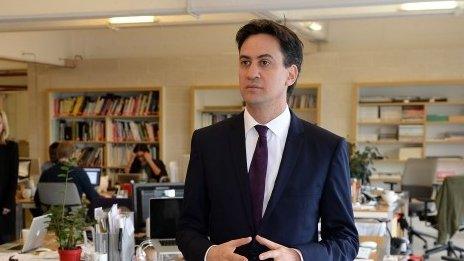Labour leader Ed Miliband: Middle class facing crisis
- Published
- comments
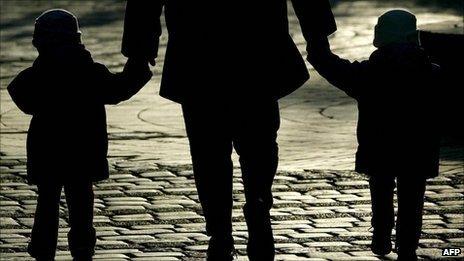
Mr Miliband said the cost-of-living crisis was affecting millions of middle class families
Labour leader Ed Miliband has said middle class families are facing a "crisis of confidence" over falling living standards.
Writing in the Daily Telegraph, external, Mr Miliband said the economic essentials that once drove and sustained the middle classes had all been undermined.
Their children's prospects must also be urgently addressed, Mr Miliband added.
The Conservatives said Mr Miliband had no plan, and offered only more spending, borrowing and taxes.
The article comes as the monthly ICM opinion poll, external for The Guardian suggests Labour's lead has been cut to 3% - in the same series of polls it was 5% in December and 8% in November.
Mr Miliband, characterised by his opponents as an old-style left-winger, wrote that Labour would "rebuild our middle class".
Fundamental threat
The Labour leader said the country could not succeed unless that middle class was strong and vibrant.
He said his long-standing message about a cost-of-living crisis did not just apply to those on zero-hour contracts and the minimum wage, but also to millions of families who never dreamed that life would be a struggle.
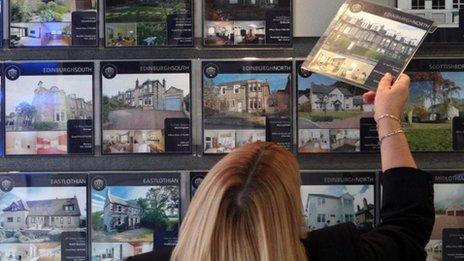
Labour says many people face waiting "until middle age" to buy their first home
Among their concerns, he highlighted access to further education, good-quality jobs and secure pensions.
He said: "Our country cannot succeed and become collectively better off unless Britain has a strong and vibrant middle class.
"Indeed, the greatest challenge for our generation is how to tackle a crisis in living standards that has now become a crisis of confidence for middle-class families."
Mr Miliband said that as well as falling real wages and rising costs for items including food, childcare, energy and transport, the middle class was facing a more fundamental threat.
"The motors that once drove and sustained it are no longer firing as they used to," he said.
"Access to further education and training, good quality jobs with reliable incomes, affordable housing, stable savings, secure pensions: they have all been undermined."
Hard-pressed
There is little detail in the piece about how these problems might be corrected, although more announcements are promised in the coming days.
Mr Miliband is due to give a major speech on the economy later this week.
Labour vice-chairman Michael Dugher told the BBC his party was talking about "the millions of hard-pressed families who are feeling the pinch" - people who felt insecure in their jobs, concerned about their income in retirement and worried about their children's future, particularly their chances of being able to own their own home.
"They may be cracking open the champagne at the Treasury and saying 'job done'," he told BBC Radio 4's The World at One.
"But they have no idea of the hardship facing families on low and middle incomes."
Conservative Party chairman Grant Shapps said: "Many people who work hard are facing tough times today because they have been made poorer by the worst recession in a century - a recession presided over by Ed Miliband and the Labour government he was part of.
"The only way to ensure a better and more financially secure future for hardworking people and for their children is to stick to David Cameron's long-term economic plan - reducing the deficit, creating jobs, cutting taxes, giving young people the skills they need to get on and fixing the welfare system so that it pays to work.
"But Ed Miliband has no plan. He has opposed every difficult decision we have taken to start turning our economy around.
"All he offers is more of the same old Labour policy that got us into a mess in the first place - more spending, more borrowing and more taxes.
"That would mean a less secure future for hardworking people and their families."
The ICM poll for the Guardian puts Labour support at 35%,, the Conservatives on 32%, Lib Dems on 14% and UKIP on 10%. ICM interviewed 1,005 adults by telephone from 10 January to 12 January.
- Published14 January 2014
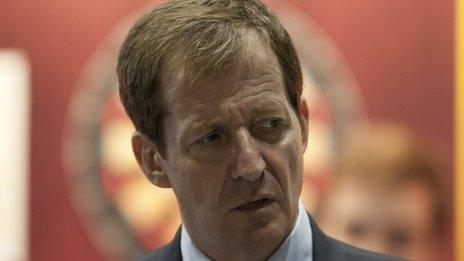
- Published7 May 2014

- Published5 January 2014
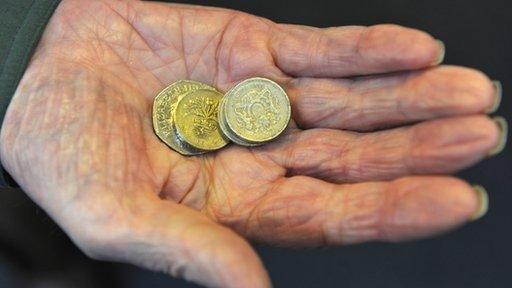
- Published30 December 2013
